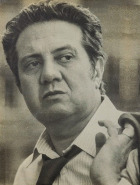

After completing his degree, Mário Soares considered enrolling in a Pedagogical Sciences course to teach history at secondary school level. However, he abandoned this plan and was later appointed administrator of the Colégio Moderno, where he also taught history and philosophy (Vieira, Mário Soares – Uma vida [Mário Soares – A Life], 2013, pp. 105, 108). During this period , he published several historically inclined articles in journals and newspapers. One notable example is A justificação jurídica da Restauração e a teoria da origem popular do poder político [The Legal Justification of the Restoration and the Theory of the Popular Origin of Political Power], published in Jornal do Fôro in 1954. In this article, he examined the legal foundations of documents used by jurists of the time and historiographical works addressing these issues ( Soares, A justificação jurídica da Restauração... , 1954, pp. 23–24, 29–32). Additionally, he contributed to Joel Serrão’s Dicionário de História de Portugal [Dictionary of Portuguese History] initiated in 1963, writing several entries with a legal focus. Even during his deportation to São Tomé (1968–1969), he wrote a letter to Vitorino Magalhães Godinho expressing his intention to conduct a socio-economic historical study of the island, although it remains unknown whether he completed this project (ANTT, NT: 1190, fls. 58–60).
In the meantime, Soares earned a second degree from the Faculty of Law at the University of Lisbon (1952–1957), where he encountered figures such as Adelino da Palma Carlos and Marcello Caetano. This period was followed by what Soares described as a “crossing of the desert,” during which both his political life and the opposition movement against the regime were stagnant. This situation changed with the advent of the "Delgado hurricane" in 1958. Soares became involved in General Humberto Delgado’s presidential campaign, signed the Programa para a Democratização da República [Programme for the Democratisation of the Republic] in 1961, ran for the National Assembly with the CEUD coalition in 1965, and acted as Delgado's family lawyer following his assassination. Soares was repeatedly arrested by the PIDE, the regime’s political police, and was deported to São Tomé between 1968 and 1969. He returned to mainland Portugal later that year but was forced into political exile in 1970.
This work is financed by national funds through FCT - Foundation for Science and Technology, I.P, in the scope of the projects UIDB/04311/2020 and UIDP/04311/2020.
